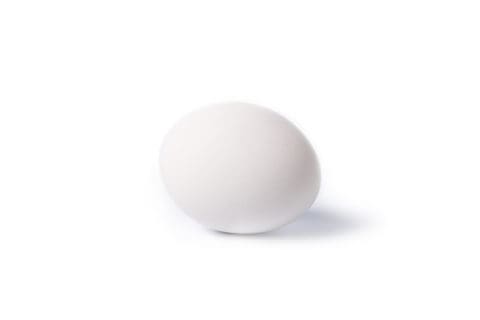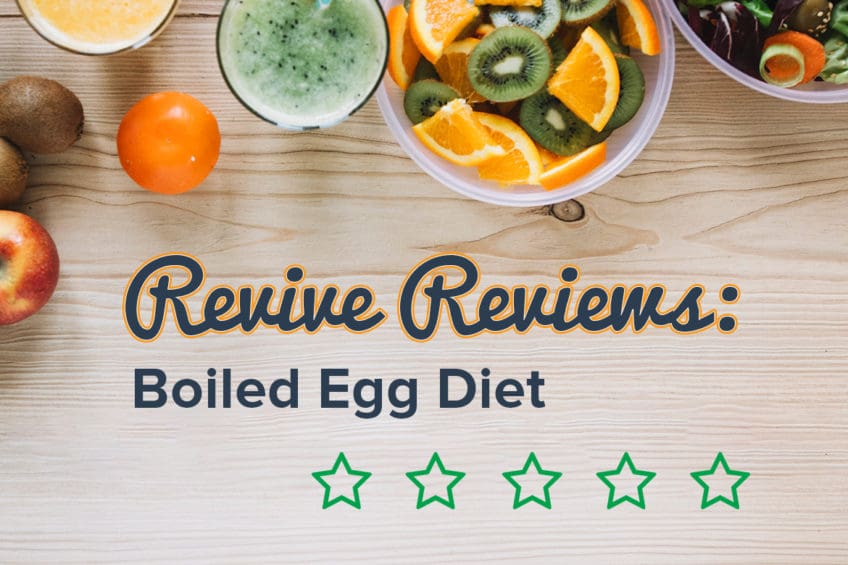The Boiled Egg Diet: Reviewed by a Dietitian
We took a deeper look into this boiled egg diet menu to see exactly what it’s providing the consumer. Frankly, in our review of the boiled egg diet we found a few issues that don’t sit very comfortably with us, and after a closer look it appears that this diet is reinventing the “crash diet” wheel.
First Issue: There’s more to eating than boiled eggs.
A lot more is suggested in this diet than just boiled eggs. In fact, chicken shows up almost just as regularly as eggs do. So really, the Boiled Egg Diet one step away from being called the Chicken Diet. And really, the other foods found on the menu aren’t anything out of the ordinary. So it’s not as if the menu only includes boiled eggs, or even includes boiled eggs at every meal, as the name might imply. There is simply nothing magical about boiled eggs as the be-all-end-all of diet food.
This is interesting, because the article states, “consuming eggs provides all the necessary healthy nutrient and vitamins for the human body.” Let’s be clear here—no food contains all the macro and micronutrients the human body needs in the right proportions. That’s why it’s always recommended to consume a variety of foods, especially plant foods, throughout the day to obtain the nutrients we need. If you ate the same amount of calories as the entire Boiled Egg Diet contains on average but only ate boiled eggs, you would get no Vitamin C or fibre, almost no vitamin K or vitamin B3, and very little copper, manganese, or magnesium (based on 10 boiled eggs a day). And personally, by day three I would never want to look at another boiled egg again.
Second Issue: The boiled egg diet isn’t practical.
This diet plan does not provide any practical suggestions on how to incorporate the eating pattern into daily life. The food choices are extremely vague and generally lack any sort of direction towards type, portion size, or preparation. “Salad” shows up numerous times throughout the menu. What kind of salad? How much salad? Salad could mean nothing more than a mere shredded leaf of lettuce with a drizzle of vinegar (less than 100 calories and very little nutrients), or it could be a salad of greens, nuts, seeds, cheese, fruit, vegetables, and dressing and run over 1000 calories but very high in nutrients. For any eating program to be successful, some sort of education needs to be provided on the types of food and portion sizes and how they affect the body. If you as a reader aren’t empowered to make confident decisions moving forward, you will likely not be able to continue to see the type of results you want.
Third Issue: The “facts” behind the diet don’t hold up.
This leads to the third and final point. This article contains several statements about your calorie intake and metabolism when on the boiled egg diet, but they hold no weight when examined a little closer.
The diet promotes an incredibly low calorie level.
The first thing that jumped out to me was their claim that “to lead a healthy diet does not mean you have to starve.” I totally agree! But according to our analysis, the menu provided by the boiled egg diet contains on average a very, very low 700-800 calories a day. I’m going to guess that at least most people will feel starving at this calorie level.
It’s not sustainable weight loss.
In this article, the author writes, “In 2 weeks this diet can help you lose more than 24 pounds…” The original source cited in this article also states, “Nutritionists and Health Experts all over the world claim that the boiled eggs diet will help you to lose 24 pounds for only 2 weeks.” Please be aware that they do not list even one name of a nutritionist or health expert who backs this claim. It’s true that at 700 calories a day, you will lose weight very quickly, but not in a good way. Sustainable weight loss usually looks like 1-2 pounds per week. But 1-2 pounds per day is not sustainable.
Dieters will miss their nutrient targets.
The article also claims that “the reduction of calories should not be so rigorous that you are…not able to obtain the sufficient amount of necessary nutrients.” However, with the boiled egg diet it would be almost impossible to even come close to meeting all of our macro and micronutrient needs, therefore it is not meant to be a long-term plan. Your body needs much more, and therefore, (as with most extreme weight loss diets) you will likely see a weight rebound in once you return to a normal pattern of eating.
With this diet, metabolism won’t increase—it will decrease.
Amazingly, on only 700 calories per day, the article claims, “you will significantly better your metabolism.” Unfortunately, almost the exact opposite is true. The research shows that individuals who restrict their energy intake for a longer period of time (more than 2 weeks) can actually cause their energy metabolism to work against them, as their metabolic rate can slow down even after returning to their previous level of energy intake (Müller & Bosy-Westphal, 2013).
In Summary
After close examination, the boiled egg diet fails for a number of reasons. It’s another low calorie, crash diet that will expectedly cause a weight rebound. The creators of this diet are unable to provide clear direction on how to hit nutrient needs throughout the day, leaving the consumer is guessing at types of foods and portion sizes, and therefore creating varied rates of success (or lack thereof).
What the creator actually do well is suggest quality foods. Eggs and chicken are high quality, nutrient-dense proteins. Salad can be a very fibre rich and nutrient-dense meal, or it can be very high calorie and low in nutrients. It’s not the types of foods that they are suggesting that are the problem, but rather the lack of quantity and direction.
When it comes to weight management, improving your health and living the life you dream, there is always hope. Your food choices and your lifestyle play a significant role in your health and how you feel throughout your day-to-day life. While the idea of spending just two weeks to lose the weight that took years to accumulate may sound attractive, it is not a promise that will stick. This is the only body we have in this life, so let’s be kind to it: let’s challenge it and push forward, but please, above all, take care of it.
By Raina Beugelink – Registered Dietitian (aka Nutritionist)
Revive Wellness is a team of passionate and evidence-based Registered Dietitians specialized in nutrition and wellness coaching for the Edmonton area.
Ready to Ditch the Diet for Good?
Sources:
Müller, M. J., & Bosy-Westphal, A. (2013). Adaptive thermogenesis with weight loss in humans. Obesity, 21(2), 218–228. https://doi.org/10.1002/oby.20027
Canadian Nutrient File. (2015). Egg, chicken, whole, cooked, boiled in shell, hard-cooked. https://food-nutrition.canada.ca/cnf-fce/serving-portion.do?id=130

